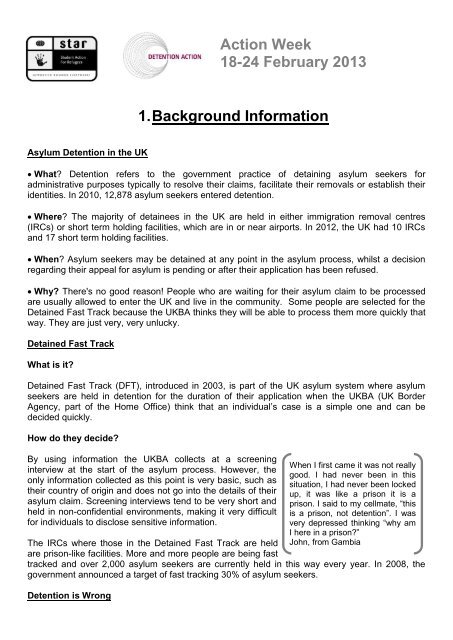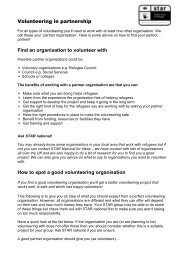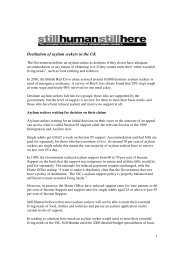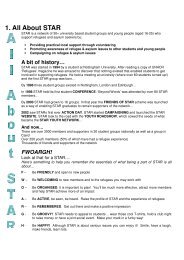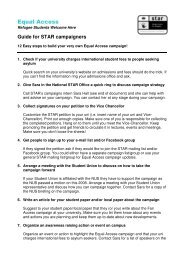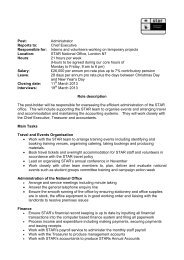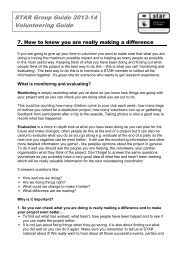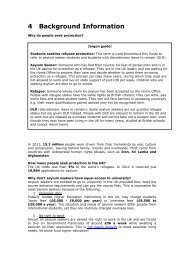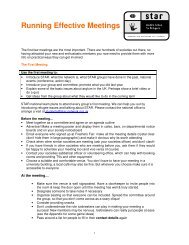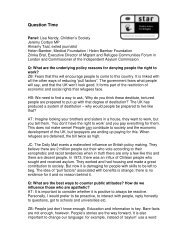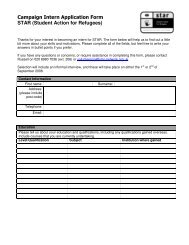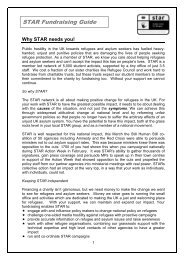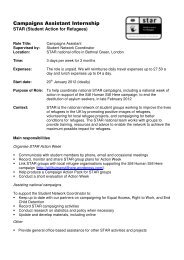Background Information - Student Action for Refugees
Background Information - Student Action for Refugees
Background Information - Student Action for Refugees
Create successful ePaper yourself
Turn your PDF publications into a flip-book with our unique Google optimized e-Paper software.
<strong>Action</strong> Week<br />
18-24 February 2013<br />
1. <strong>Background</strong> <strong>In<strong>for</strong>mation</strong><br />
Asylum Detention in the UK<br />
What? Detention refers to the government practice of detaining asylum seekers <strong>for</strong><br />
administrative purposes typically to resolve their claims, facilitate their removals or establish their<br />
identities. In 2010, 12,878 asylum seekers entered detention.<br />
Where? The majority of detainees in the UK are held in either immigration removal centres<br />
(IRCs) or short term holding facilities, which are in or near airports. In 2012, the UK had 10 IRCs<br />
and 17 short term holding facilities.<br />
When? Asylum seekers may be detained at any point in the asylum process, whilst a decision<br />
regarding their appeal <strong>for</strong> asylum is pending or after their application has been refused.<br />
Why? There's no good reason! People who are waiting <strong>for</strong> their asylum claim to be processed<br />
are usually allowed to enter the UK and live in the community. Some people are selected <strong>for</strong> the<br />
Detained Fast Track because the UKBA thinks they will be able to process them more quickly that<br />
way. They are just very, very unlucky.<br />
Detained Fast Track<br />
What is it?<br />
Detained Fast Track (DFT), introduced in 2003, is part of the UK asylum system where asylum<br />
seekers are held in detention <strong>for</strong> the duration of their application when the UKBA (UK Border<br />
Agency, part of the Home Office) think that an individual’s case is a simple one and can be<br />
decided quickly.<br />
How do they decide?<br />
By using in<strong>for</strong>mation the UKBA collects at a screening<br />
interview at the start of the asylum process. However, the<br />
only in<strong>for</strong>mation collected as this point is very basic, such as<br />
their country of origin and does not go into the details of their<br />
asylum claim. Screening interviews tend to be very short and<br />
held in non-confidential environments, making it very difficult<br />
<strong>for</strong> individuals to disclose sensitive in<strong>for</strong>mation.<br />
When I first came it was not really<br />
good. I had never been in this<br />
situation, I had never been locked<br />
up, it was like a prison it is a<br />
prison. I said to my cellmate, “this<br />
is a prison, not detention”. I was<br />
very depressed thinking “why am<br />
I here in a prison?”<br />
John, from Gambia<br />
The IRCs where those in the Detained Fast Track are held<br />
are prison-like facilities. More and more people are being fast<br />
tracked and over 2,000 asylum seekers are currently held in this way every year. In 2008, the<br />
government announced a target of fast tracking 30% of asylum seekers.<br />
Detention is Wrong
<strong>Action</strong> Week<br />
18-24 February 2013<br />
In Britain we have a long, proud history of protecting people fleeing persecution and preventing the<br />
detention of those who have done nothing wrong. The detention of asylum seekers goes against<br />
both of these traditions.<br />
It is wrong to lock up people who are fleeing persecution as soon as they arrive in the UK. The UK<br />
has signed the UN Convention on <strong>Refugees</strong> and there<strong>for</strong>e it's perfectly legal to claim asylum.<br />
It Doesn’t Work<br />
The asylum process is supposed to examine the facts<br />
put by the person asking <strong>for</strong> protection and grant<br />
refugee status to those who need it.<br />
DFT is ineffective at finding out the true facts of an<br />
asylum case and punishes rather than protects those<br />
who need it.<br />
Stressful. It is really bad. There’s<br />
nothing I can do. I don’t even have a<br />
solicitor, and it is hard work to do<br />
everything myself. I am tired being here,<br />
I miss my kids so much. I cannot take it<br />
no more. Maybe that’s their plan, so<br />
that we can all give up on our life. This<br />
is torture now.<br />
-Mallan, from Malawi<br />
There is good evidence that a successful asylum<br />
system allows asylum seekers to live in the community,<br />
receive good legal advice and engage with the people<br />
making a decision on their claim. This was trialled in 2008 under a programme called the Solihull<br />
Pilot and found that:<br />
Cases were concluded almost twice as quickly as those elsewhere.<br />
Better, more sustainable decisions meant that the number of allowed appeals was halved.<br />
“Considerable potential savings” were identified. The lower rate of allowed appeals meant that<br />
the rise in the Legal Aid budget could be offset by significant savings in UKBA support, Legal<br />
Service Commission funds and Tribunal costs.<br />
The number of people absconding reduced significantly.<br />
The rate of grants of refugee status almost doubled.<br />
The number of removals (as a proportion of refusals) increased.<br />
In Australia asylum seekers who in the past would have been detained are now living in the<br />
community and provided with case management support. For people who are refused asylum, the<br />
number agreeing to leave voluntarily has increased dramatically.<br />
It Harms Vulnerable People<br />
The screening process to decide who is put into Detained Fast Track is very short, public and<br />
ineffective and leads to vulnerable people being locked up.
<strong>Action</strong> Week<br />
18-24 February 2013<br />
The Home Office states that children, heavily pregnant<br />
women, victims of torture and trafficking and people with<br />
severe mental or physical disabilities should not be put into<br />
Detained Fast Track. However, a recent government report<br />
found that of 114 cases originally thought suitable <strong>for</strong> Fast<br />
Track, 30% had to be released. For example, a Zimbabwean<br />
politician, who arrived in the UK with obvious and unhealed<br />
torture wounds on his head, was put into DFT.<br />
I didn’t understand fast track<br />
be<strong>for</strong>e, and I still don’t<br />
understand it now. It is a way <strong>for</strong><br />
them to save money and send<br />
people home, because there is<br />
no truth on fast track. My solicitor<br />
asked immigration to remove me<br />
from fast track as my case is not<br />
suitable <strong>for</strong> it.<br />
-Mallan, from Malawi<br />
The United Nations High Commissioner <strong>for</strong> <strong>Refugees</strong> has<br />
said that the UK’s inadequate screening processes means<br />
that rape victims and torture survivors can find themselves being led off to a detention centre,<br />
sometimes in handcuffs, as soon as they arrived in Britain to claim asylum, which he described as<br />
“inhumane”.<br />
The UN is Against Detention of Asylum-Seekers<br />
The UNHCR (United Nations High Commissioner <strong>for</strong> <strong>Refugees</strong>) has called <strong>for</strong> the UK to use<br />
alternatives to detention:<br />
UNHCR’s Alice Edwards launched UNHCR’s Guidelines on the Detention of Asylum Seekers with<br />
the following words from the Agency:<br />
Seeking asylum is not a criminal act.<br />
Indefinite and arbitrary <strong>for</strong>ms of detention are prohibited under international law.<br />
UNHCR is disappointed that many countries continue to hold asylum-seekers in detention,<br />
sometimes <strong>for</strong> long periods of time and in poor conditions, including in some cases in prisons<br />
together with common criminals.<br />
UNHCR calls on Governments to pay special attention to vulnerable asylum-seekers, such as<br />
victims of torture and trauma, older people or people with disabilities, and children.<br />
UNHCR research has indicated that irregular migration is not deterred even by stringent<br />
detention practices and that more than 90% of asylum-seekers comply with their conditions of<br />
release when freed from detention.<br />
http://www.unhcr.org/505c461f9.html<br />
"Guidelines on the Applicable Criteria and Standards relating to the Detention of Asylum-Seekers<br />
and Alternatives to Detention" UNHCR 2012.<br />
STAR Says: Detention is wrong. Detained Fast Track should end!
<strong>Action</strong> Week<br />
18-24 February 2013<br />
Find out more online:<br />
Go to the STAR website www.star-network.org.uk<br />
Go to the Detention <strong>Action</strong> website www.detentionaction.org.uk<br />
Go to the UNHCR website http://www.unhcr.org/505b10ee9.html<br />
Watch the film by our very own STAR founder Andy Davies!<br />
http://www.channel4.com/news/government-breaching-rules-on-torture-victims


